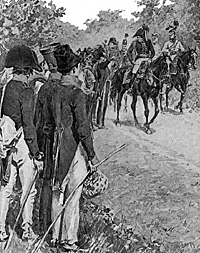 Some memoirs of Napoleonic soldiers give us a pretty good inside look at the soldier's life while on campaign or in garrison. Memoires de Parquin fit that category quite well.
Some memoirs of Napoleonic soldiers give us a pretty good inside look at the soldier's life while on campaign or in garrison. Memoires de Parquin fit that category quite well.
Charles Parquin, like many of Napoleon's officers, belonged to the bourgeoisie and gives us an account of the life, morals, and views of the class he came from. He was well educated, well mannered, and had all the attributes of a gentleman among which honor and discretion occupied an important place.
He enlisted in 1803 at the age of sixteen in the 20th Regiment of Chasseurs a cheval and took part in many major campaigns including those in Prussia, Austria, Poland, Spain, Saxony and France. Like many soldier's families, his parents were able to send money to help him somewhat soften the rigors of his campaigns.
Women played an important role in the life of a Napoleonic soldier and in addition to his military activities, Parquin covers quite freely his numerous amorous adventures, which were quite typical of the soldiers of the time. In Moscow, an officer wondered: "Where are the women?" This is a subject we'll have the opportunity to cover further in future issues.
First Encounter
Then came another discreet liaison with Mademoiselle Van de... when Charles was billeted in Breda (Holland). When his regiment left Breda to participate in the Campaign of 1806 in Prussia and Poland, "we were ordered to cut off our queues and tresses. This order upset us greatly."
Parquin was made a prisoner by the Russians on February 15, 1807, at Trunkenstein and sent to Russia via Russian Poland. [3] He describes how French prisoners were treated by the Russians in 1807: [4]
"As prisoners of war we received only bread of inferior quality. Each soldier was paid 2 1/2 sous and as I was an NCO I received twice the sum, 5 sous. I must admit that orders concerning us were characterized with a certain humanity, and if our suffering was considerable,
it was due to the harshness of the climate, the poverty of the country and our wounds, and certainly not to the harshness of the Russian commanders."
Meet the Czar
The Russian Czar met the French prisoners and asked if they were treated well. He even gave
Parquin money to distribute among the prisoners.
Charles was fortunate to have money [5] and that helped him
and some of his companions considerably. With five fellow prisoners he formed a mess and they
were able to purchase three pounds of beef and vegetables to improve their diet every day.
In addition, while in Russian Poland Charles and his comrades were helped by the sympathetic local population and the local nobles, but as soon as they were in Russia that became a different story: "The genuine interest, the assistance and the sympathy we had been accustomed to in Poland no longer came from anyone except the boyars, that is the local noblemen."
Then after the Treaty of Tilsit, the prisoners were repatriated and our hero rejoined his regiment which was garrisoned in several different locations in Germany. In 1809, the regiment found itself in Beckenheim near Frankfurt-am-Main. Charles, now a quartermaster, tells us:
Then came time to depart and Parquin left his billet at five in the morning. He discovered he had forgotten the notebook he used for matters relating to his troop. He returned to the rabbi's house and, "When I reached it I found the main door open....I therefore went upstairs
and entered without knocking and made my way to my room....I was astonished to find the lovely Sarah weeping on my bed! She was wearing a morning gown and her beautiful black hair hung in disorder over her shoulders. In her hands she held my notebook which she was covering in tears.
"At that unexpected sight I was at first speechless, but I quickly recovered and approached her, saying as gently as possible: 'Why are you weeping, Sarah?'
"I am weeping for you, ungrateful wretch!" And more tears came flowing fast. This explanation left me no doubt, so I did my best to console the delightful girl. I told her
that now I was aware of her love, I told her I was heart broken to be leaving....
"Our happy moments together flew by; the neighing of my horse which my orderly was holding in the street...reminded me of my duty. I had to leave the tender-hearted Sarah who
gave me my notebook with a plea that I should tear out and give to her the first page on which I had written my name.
"Thereupon I wrote her name beside mine together with the date which, I assured her would be the happiest day in my life, and in this page I wrapped a locket containing some of my hair....its effect was magical. 'You make me so happy by giving me this souvenir, Charles,' she
said, 'But we must say farewell, for if my father found me in your room he would have me locked up for the rest of my days.'
"I tore myself from the arms of the tender Jewess and, deeply moved after this unexpected encounter, I left the house. As I galloped away, the cool morning air brought me to myself." [6]
Bayreuth
Then, in March 1809, the 20th Regiment was sent to Bayreuth where it remained a few weeks before participating in the Campaign of 1809 against Austria. "I was billeted in the
town itself....I went into the haberdashery shop that was across the square....I was pleasantly
surprised to find an attractive young woman in charge of the shop. More engrossed in studying her charming appearance than making my purchases....
"Early next morning I returned to the shop to make some more purchases. A man who was in the
shop and who seemed to be twice as old as the young woman was good enough to inform me of her name when he said in German 'Louise, pass me the box of gentlemen's gloves.'
"...Thus on my second visit I had learned the name of the lady who had so caught my attention....I wasted no time in using the information I had gained. On the third day I carefully observed the shop from my window until I saw the man leave. I immediately went across to the shop and entered on the pretext of buying a few small articles.
'Where is the letter?'
'Here it is,' I said for I still had it in my hand. "The letter, which Gasner, one of the quartermasters, had translated into German for me, read as follows:
"A quarter of an hour later, the same messenger brought me an answer which was as brief and to the point as my original note.
'Tomorrow at seven o'clock my husband is going to play in an amateur concert. He will be there until nine o'clock. Be in the lane at quarter to seven. The shop will be closed. There will be someone to guide you.'
"Needless to say, I was at the appointment on time....I felt someone take my hand....my guide led me in a room lit only by a fire burning in the grate....She told me to wait....I
examined the contents of the dim lit room and the first object that caught my eyes was a bed.
"'Good!' I thought as I sat down on it. A minute later the key to the room turned in the lock and the rustle of a satin robe indicated that the mistress of the house had arrived!
"Is that you, Louise?"
"'Yes, Charles,' she answered.
"Then, in true German style, she fell into my arms. It must be obvious that I was immediately made welcome and the story, so to speak started at the final chapter. "An hour passed in this delightful tete-a-tete and our meeting continued in this manner for the next three weeks on the evenings when her husband went to play the bassoon at various concerts.
"The regiment left Bayreuth after being there a month. To take my leave of Louise I went to the shotpitself for I made daily purchases there for the troop. Her husband had become so used to seeing me there, that he offered me a farewell glass of wine. As I was leaving the shot
Louise bade me goodbye in his presence, but it was in a more restrained manner than would have
been called for by our relationship. I had, however, spent the hour with her the previous evening and then she had shown me by her passion and her sobs how sad she was to lose
me - or at least, this was the impression that she gave me."
Wounded
Parquin was wounded in the early part of the 1809 operations but fully recovered and participated in the latter part of that bloody campaign.
Then, in 1810, the regiment was sent to Spain. Charles was now twenty-three and an officer.
"At Salamanca my duties as adjutant obtained for me excellent quarters in the house of a beautiful Spanish noble woman, Dona Rosa de la N... whose husband, a colonel in the Spanish army, had died two years previously....whatever her age, Dona Rosa was one of the most enchanting women I have ever seen in my life. She was quite small, but her movements were marked by a supple gracefulness....
"Mine were pretty good winter quarters....Every evening I spent an hour or two by the fire with my hostess. I had to avoid politics in our conversation as Dona Rosa, who was as proud as any Spaniard could be, would not tolerate contradiction. In the end I persuaded her to agree to banish politics from our conversation. This was a considerable achievement, but had I not a far more pleasant subject to touch upon with this charming woman....
Of course, our hero was also involved in military operations, and quite understandably that did not please Dona Rosa. One day after a military action, Charles returned to his quarters. He tried to enter Dona Rosa's room by a door which only he used, but the key had been removed.
The next day he received an invitation to lunch with the lady of the house who was extremely cool toward him. After the meal a violent argument took place in which Dona Rosa became hysterical. Parquin felt that it was better for him to leave and, "the next day as I left her house I sent a letter thanking her for the hospitality which I had received from her
stating that I would no longer require my quarters....Then, I galloped off, never to see her again...."
Parquin campaigned in Spain until October 1812, when, wounded, he was recalled to France and spent the winter in Paris with his family recuperating from his wounds.
1813
In 1813, he became a member of a reformed Chasseurs squadron of the Imperial Guard and was sent once more to Germany. On his way there the regiment stopped in Epernay and our brilliant cavalier, now an officer of the Legion of Honor, was billeted in the house of a rich
widow on the main street.
The lady of the house was absent and in his room Charles, still covered with dust, was welcomed by a beautiful girl who brought refreshments. "My mind was fully occupied with the extremely pretty girl...."
"'What is your name Mademoiselle? You must surely be the prettiest woman in this town.'
"Without commenting on my observation, which made her blush and laugh at the same time, she
answered promptly: 'My name is Adele, sir; I am Madame's chambermaid. If I can be of any
service to you, sir, just ask.'
"'I will take you to your word, Mademoiselle, and take immediate advantage of your offer. Would you sew this ribbon on my croix d'honneur in place of the old one which is faded?'
"The young girl took the ribbon and hurried away to her room which was near mine. In a few minutes she was back with my cross....Then she bent forward rapidly and put her lips to
the image of the Emperor. Her enthusiastic kiss was so full of feeling that it made my heart pound beneath my decoration. I was quite moved by her gesture and said: 'Truly you are
devoted to the Emperor.'
"'Sir,' she said, 'were I a man, the Emperor would have no better servant than myself.'
"'Indeed! You are tall, handsome and strong. You should become one of his servants. I assure you I would have the greatest pleasure in helping you to become one.'
Then Parquin's regiment crossed the Rhine and fought in the Campaign of 1813 in Saxony and
Prussia and then, later, in France, in the Campaign of 1814.
Looking back on the Campaign
1806, Parquin sheds some light on the! feeding of the 20th Chasseurs prior to the Battle of Jena: "Because of the proximity of the village of Gera, we were able to have supply of sheep and geese for these are raised in great numbers in Saxony. Our encampment was in a potato field and we dug up the potatoes with our bayonets. The regiment had just been issued with
these new weapons, but this was the only use we made of them...."
Of course there is a great deal more in Parquin's Memoires, especially on military matters, but I'll let you discover this for yourself.
[1] Parquin's regiment was then stationed in Lannion near Rennes in Britanny.
Parquin, Denis-Charles, Memoires de Parguin, were first published in 1842, while Parquin was serving a twenty-year prison sentence for his part in the abortive attempt by
Louis Napoleon (the future Napoleon III) to seize power.
Napoleon and Women, Part I (EE&L#7) This article appears in MagWeb (Magazine Web) on the Internet World Wide Web. Charles' first encounter occurred after he was wounded in a duel and released from the hospital' [1] when he met Mademoiselle Marguerite, a young, beautiful, tall, dark-haired girl "simply dressed but strikingly neat in appearance," to use
Parquin's own words. She was a laundress at the hospital. Their liaison lasted over six months until Parquin's unit left Lannion. [2]
Charles' first encounter occurred after he was wounded in a duel and released from the hospital' [1] when he met Mademoiselle Marguerite, a young, beautiful, tall, dark-haired girl "simply dressed but strikingly neat in appearance," to use
Parquin's own words. She was a laundress at the hospital. Their liaison lasted over six months until Parquin's unit left Lannion. [2]
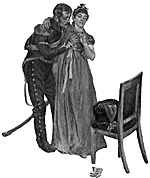 "I was billeted for two and a half months with a rich Jew who was the rabbi of the local synagogue. He was a widower and his only daughter, Mademoiselle Sarah, was a tall, dark
beauty. She was twenty years old and looked after a school of young girls of her faith. I had lived on very good terms with my hosts; I had always been polite and considerate, especially
with Mademoiselle Sarah, but our relations had stopped at that...."
"I was billeted for two and a half months with a rich Jew who was the rabbi of the local synagogue. He was a widower and his only daughter, Mademoiselle Sarah, was a tall, dark
beauty. She was twenty years old and looked after a school of young girls of her faith. I had lived on very good terms with my hosts; I had always been polite and considerate, especially
with Mademoiselle Sarah, but our relations had stopped at that...."
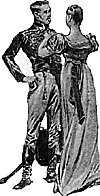 "There were a number of customers there and all I could do was to let the young woman see a
letter which I held in my hand as I saluted on leaving. When I had left the shop, I thought that my attempt had failed, but as I was going through the main entrance of my lodgings I felt
someone tug the back of my jacket. It was the young assistant from the shop. She did not give me time to ask her what she wanted, but quickly asked:
"There were a number of customers there and all I could do was to let the young woman see a
letter which I held in my hand as I saluted on leaving. When I had left the shop, I thought that my attempt had failed, but as I was going through the main entrance of my lodgings I felt
someone tug the back of my jacket. It was the young assistant from the shop. She did not give me time to ask her what she wanted, but quickly asked: 'My charming Louise, I desperately long to see you alone so that I may prove to you how your charms have captivated me. If you could find the means of meeting me alone, you would make me the happiest of men. Yours respectfully, Charles Parquin.'
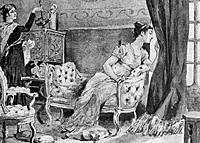 "I had been staying at the house of Dona Rosa for more than six months....I employed bribery to learn from the maid...that her mistress watched me from behind the curtain when I mounted to leave the house or dismounted on my return. This encouraging sign made me as bold as to ask if she would allow me to spend one hour each day in her company.
"I had been staying at the house of Dona Rosa for more than six months....I employed bribery to learn from the maid...that her mistress watched me from behind the curtain when I mounted to leave the house or dismounted on my return. This encouraging sign made me as bold as to ask if she would allow me to spend one hour each day in her company.
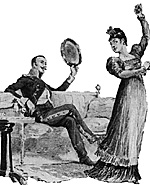 This favour was granted me. Later on, as one can imagine, I did not stop there, I made further requests and in short, I was happy, very happy indeed."
This favour was granted me. Later on, as one can imagine, I did not stop there, I made further requests and in short, I was happy, very happy indeed."
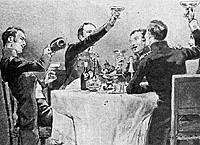 "She entered into the spirit of my jest and I won the friendship of Mademoiselle Adele who willingly agreed to meet me in her room at eleven o'clock. That evening I went to the Hotel de l'Ecu where I dine, merrily with my fellow officers. returned to my quarters by eleven
o'clock and without delay I slipped into the nearby room where Adel awaited me. A few moments later we were the best of friends...."
"She entered into the spirit of my jest and I won the friendship of Mademoiselle Adele who willingly agreed to meet me in her room at eleven o'clock. That evening I went to the Hotel de l'Ecu where I dine, merrily with my fellow officers. returned to my quarters by eleven
o'clock and without delay I slipped into the nearby room where Adel awaited me. A few moments later we were the best of friends...."
Footnotes
[2] Parquin speaks with deep respect of his affair with
Marguerite which he was happy to report that had been kept secret. Later on, she married the hospital's gardener.
[3] In 1794, what was left of Poland had been partitioned between Russia, Prussia, and Austria.
[4] The treatment of French prisoners was quite different in 1812 during the retreat from Moscow.
[5] Parquin had the good fortune to hide some forty Fredericks (a gold coin) in his uniform collar.
[6] More than thirty years later, Parquin was back in
Frankfurt, and remembered Sarah. For a moment he had the temptation to go back to Beckenheim to see Sarah and find out what had become of her. He even started out but then decided not to go. He chose to preserve a happy recollection rather than possibly destroy an illusion.
Sources
Parquin, Denis-Charles, Charles Parquin, translated and edited by B.T. Jones, Longmans, London, 1969.
Back to Empire, Eagles, & Lions Table of Contents Vol. 2 No. 8
Back to EEL List of Issues
Back to MagWeb Master Magazine List
© Copyright 1994 by Emperor's Headquarters
Other military history articles and gaming articles are available at http://www.magweb.com
